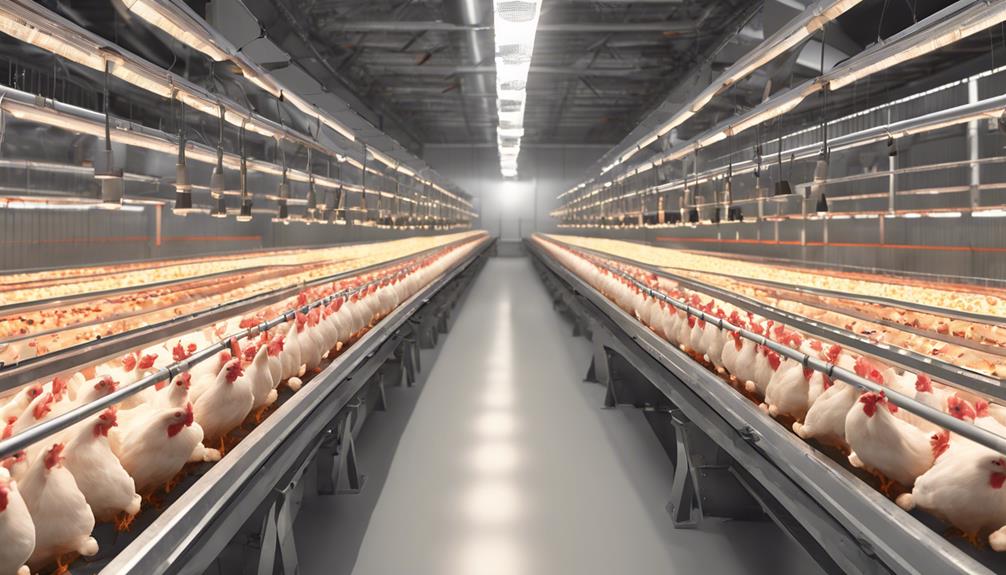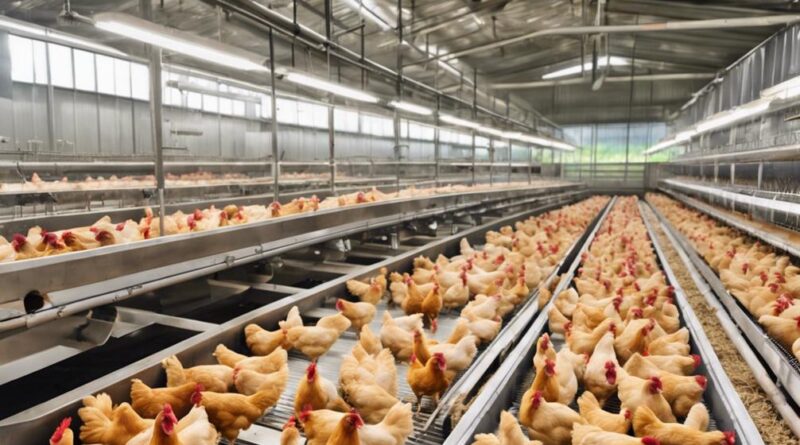What Determines Profitability in Broiler Chicken Production?"
Analyzing market demand, optimizing feed efficiency, managing disease risks, integrating technology, and implementing sound financial practices are key determinants of profitability in broiler chicken production. Understanding consumer trends, maintaining feed balance, strict disease prevention measures, utilizing technology, and effective financial planning play crucial roles in maximizing profits. By focusing on these factors, you can position your broiler chicken production for success and long-term sustainability. These strategies encompass various aspects of the production process to ensure efficiency and profitability.
Market Demand Analysis
To assess the market demand for broiler chickens, analyze consumption patterns and trends in the poultry industry. Understanding supply chain dynamics is crucial in grasping the market demand for broiler chickens. By examining the flow of broiler chickens from hatcheries to processing plants to retailers, you can identify potential bottlenecks or inefficiencies that could impact consumer access to these products. Additionally, delving into consumer behavior is essential. Analyzing factors such as demographic trends, income levels, cultural preferences, and buying habits can provide valuable insights into the demand for broiler chickens.
Moreover, investigating marketing strategies employed by key players in the poultry industry can offer valuable insights into consumer preferences and market dynamics. By conducting a competitive analysis, you can identify successful tactics used by competitors to capture market share and attract consumers. Understanding how different companies position their broiler chicken products, price them, and promote them can help you tailor your own strategies to meet consumer demands effectively.
Feed Efficiency Strategies
Analyzing feed efficiency strategies is imperative for optimizing broiler chicken production and maximizing profitability. Two key aspects that significantly impact feed efficiency are genetic selection and maintaining proper nutritional balance.
Genetic selection plays a crucial role in improving feed efficiency in broiler chickens. By selectively breeding birds with desirable traits such as faster growth rates and efficient feed conversion ratios, producers can enhance the overall efficiency of their flocks. Genetic selection programs focus on traits that directly influence feed efficiency, ultimately leading to reduced feed costs per unit of production.
In addition to genetic factors, ensuring proper nutritional balance is essential for maximizing feed efficiency. Broiler diets must contain the right combination of proteins, carbohydrates, fats, vitamins, and minerals to support optimal growth and performance. Imbalances in diet composition can lead to decreased feed utilization efficiency and hinder overall profitability.
Research indicates that a holistic approach that combines genetic selection for desirable traits with a well-balanced diet can significantly improve feed efficiency in broiler chicken production. Producers who prioritize these strategies are better positioned to achieve higher profitability by reducing feed costs and enhancing the overall performance of their flocks. By implementing targeted genetic selection practices and maintaining precise nutritional balance, producers can optimize feed efficiency and drive profitability in broiler chicken production.
Disease Prevention Measures
Effective disease prevention measures are essential for maintaining the health and productivity of broiler chicken flocks. To ensure the well-being of your birds and prevent economic losses, consider the following key strategies:
- Establish a Strict Vaccination Schedule: Implementing a comprehensive vaccination program tailored to the specific disease risks in your region is crucial for protecting your broiler chickens from common pathogens.
- Enhance Biosecurity Protocols: Strict biosecurity measures such as controlling visitor access, disinfecting equipment, and monitoring wild bird populations can help prevent the introduction and spread of diseases within your flock.
- Regular Health Monitoring: Conduct routine health checks and work closely with a veterinarian to promptly detect and address any signs of illness or disease in your broiler chickens.
- Proper Waste Management: Ensure proper disposal of litter and waste materials to reduce the risk of disease transmission and maintain a clean and healthy environment for your birds.
- Training and Education: Continuously educate yourself and your staff on best practices for disease prevention, biosecurity, and proper handling of poultry to minimize the risk of disease outbreaks and maximize the profitability of your broiler chicken production operation.
Cost-effective Housing Solutions
Cost-effective housing solutions play a vital role in optimizing the operational costs and overall efficiency of broiler chicken production systems. When considering affordable construction for broiler housing, it's essential to focus on durable materials that provide adequate insulation and ventilation to ensure the health and well-being of the birds. Utilizing cost-effective building materials that are also energy-efficient can lead to long-term savings in heating and cooling expenses. Additionally, proper space utilization within the housing structure is crucial for maximizing the number of birds that can be raised per square foot while still allowing for sufficient movement and comfort.
Research indicates that investing in well-designed housing facilities can significantly impact the overall profitability of broiler chicken production. Efficient space utilization can directly influence stocking density, reducing the cost per bird while maintaining optimal growth conditions. Moreover, affordable construction methods that prioritize durability and functionality contribute to the longevity of the housing structure, reducing maintenance costs over time.
Optimal Growth Period Management
Optimizing the growth period management strategy is crucial for maximizing broiler chicken production efficiency and profitability. To ensure success in this aspect, focus on the following key factors:
- Nutritional Balance: Providing broiler chickens with a well-balanced diet is essential for their growth and development. Ensure that the feed contains the right mix of protein, carbohydrates, fats, vitamins, and minerals to support optimal growth.
- Temperature Control: Maintaining the right temperature in the broiler house is critical for the birds' health and growth. Monitor and regulate the temperature to keep it within the recommended range for different growth stages.
- Regular Monitoring: Keep a close eye on the growth progress of the broiler chickens. Regularly weigh them to track their growth rate and adjust management practices as needed.
- Health Management: Implement a robust health management program to prevent diseases and ensure the well-being of the broiler chickens. Vaccinate them as needed and promptly address any health issues that may arise.
- Optimal Lighting: Proper lighting plays a significant role in the growth and development of broiler chickens. Ensure they receive the right amount of light each day to support healthy growth patterns.
Pricing and Sales Strategies
Broiler chicken producers can enhance profitability by strategically structuring their pricing and sales strategies based on market demand and cost analysis. Pricing strategies play a crucial role in determining the revenue of broiler chicken producers. Understanding customer demand and willingness to pay is essential in setting optimal prices. By conducting thorough market research and analyzing competitors' pricing, producers can determine the best pricing strategy to maximize profits. Additionally, implementing dynamic pricing strategies that adjust based on market conditions can help capture more value from customers.
Product differentiation is another key aspect that can drive profitability in broiler chicken production. By offering unique products or services that set them apart from competitors, producers can attract more customers and potentially charge premium prices. This could involve selling organic or free-range chicken products, which are in high demand due to their perceived health benefits and ethical considerations. Effective product differentiation not only attracts new customers but also enhances customer retention by building brand loyalty.
Incorporating customer retention strategies into sales tactics is crucial for long-term profitability. Building strong relationships with customers through loyalty programs, personalized services, and excellent customer support can increase repeat purchases and reduce customer churn. By focusing on pricing strategies that align with market demand, product differentiation that sets them apart from competitors, and customer retention techniques that foster loyalty, broiler chicken producers can optimize their profitability in a competitive market.
Technology Integration in Production

How can technological advancements enhance efficiency and productivity in broiler chicken production processes? Integrating automation benefits and data analytics can revolutionize the way poultry farms operate. Here are five key aspects to consider:
- Automated Feed Systems: Implementing automated feeding systems ensures precise and timely feeding, optimizing the growth of broiler chickens.
- IoT Integration: Connecting IoT devices allows for real-time monitoring of environmental conditions such as temperature and humidity, leading to better management practices.
- Data Analytics for Health Monitoring: Utilizing data analytics to track bird health metrics can enable early detection of diseases, reducing mortality rates and increasing overall productivity.
- Precision Farming Techniques: Adopting precision farming methods like precise feed calculations and targeted medication delivery can minimize resource wastage and maximize output.
- Automated Egg Collection: Implementing automated egg collection systems streamlines the harvesting process, saving time and reducing labor costs.
Financial Management Techniques
Efficient financial management techniques play a crucial role in optimizing profitability within broiler chicken production operations. Budget planning is a fundamental aspect of financial management in broiler chicken production. By meticulously planning and allocating financial resources for various aspects such as feed, medication, housing, and labor, producers can ensure that they're operating within their financial means while maximizing output. Research indicates that broiler chicken producers who engage in comprehensive budget planning tend to achieve higher levels of profitability due to better cost control and resource utilization.
Revenue tracking is another essential financial management technique in broiler chicken production. Monitoring and analyzing revenue streams from chicken sales, eggs, and any other related products allow producers to gain insights into their income sources. By closely tracking revenues, producers can identify trends, assess the impact of pricing strategies, and make informed decisions to enhance overall profitability. Studies have shown that effective revenue tracking is linked to increased profitability in broiler chicken operations.
Frequently Asked Questions
How Do Weather Patterns Affect Broiler Chicken Profitability?
Weather patterns can significantly impact broiler chicken profitability. Environmental factors like temperature and humidity can affect feed efficiency and growth rates.
Disease prevention is crucial during weather fluctuations. Implementing effective management strategies is essential to mitigate risks. Monitoring and adjusting to weather changes can help optimize broiler chicken production.
What Impact Does Transportation Logistics Have on Profitability?
When analyzing profitability in broiler chicken production, it's crucial to consider the impact of transportation logistics. Efficient supply chain management can streamline operations, reduce costs, and enhance overall profitability.
Are There Regulations That Influence Broiler Chicken Profitability?
Regulatory compliance in broiler chicken production is crucial. Meeting industry standards ensures market access and consumer trust. Regulations cover areas such as food safety, animal welfare, and environmental impact, all influencing profitability.
Adhering to these rules may require investments in technology or process adjustments, impacting costs. Furthermore, market demand for ethically produced chicken is rising, making regulatory compliance not just a necessity but also a potential competitive advantage in driving profitability.
How Does Consumer Behavior Impact Broiler Chicken Profits?
When it comes to how consumer behavior impacts broiler chicken profits, market demand and pricing play crucial roles.
Understanding consumer preferences and tailoring marketing strategies accordingly can significantly influence profitability in broiler chicken production.
What Role Does Employee Training Play in Profitability?
When it comes to profitability, employee training is vital.
By focusing on performance evaluation and productivity metrics, you can measure the impact of skill development and training techniques on your broiler chicken production.
Investing in training not only enhances employee skills but also boosts overall efficiency and output.
Well-trained staff tend to work more effectively, leading to improved profitability in the long run.
Conclusion
In conclusion, profitability in broiler chicken production is determined by a combination of factors:
- Market demand analysis
- Feed efficiency strategies
- Disease prevention measures
- Cost-effective housing solutions
- Optimal growth period management
- Pricing and sales strategies
- Technology integration in production
- Financial management techniques
By implementing these key factors effectively, producers can maximize their profits and ensure a successful and sustainable business operation in the competitive poultry industry.
